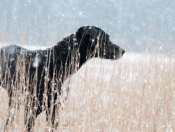It’s getting cold out there and our thoughts are turning to the extra precautions we need to take to keep our animal companions healthy and safe through the winter months. The colder temperatures and shorter days bring unique challenges for our animals and we will need to take extra care to avoid cold weather related injuries and illnesses. Follow these tips to ensure that your furry friend has a healthy and happy winter.
Some animals love to hang around outside, and while it is fine to let your animal enjoy a day in the sun when its warmer out, even sunny days in winter may be too cold for outside time. An easy way to gauge whether or not your animal companion should be spending time outside is to remember that if you wouldn’t want to be out in it, then your animal probably shouldn’t be either. As temperatures drop, we need to be mindful that our animals can’t spend long stretches outside exploring or lounging. Even if it is a bright, sunny day, laying on the ground can give them a chill and aggravate stiff, arthritic joints.
Additionally, if there is snow or ice on the ground, be sure to limit your animal’s outside time to only what is necessary. Paw pads can easily become irritated and cracked from walking on ice or snow, which is painful itself, but can also lead to infection. And, be sure to avoid letting your animal walk on areas that have been salted to melt ice. Many de-icing products are toxic to animals and can become lodged in or cause cuts to paw pads. Outside time in the warmer months, especially walks on pavement, should toughen up your animal’s paw pads, but you may also want to consider having your animal wear booties for walks in ice and snow to prevent painful irritations and scrapes. If you use a de-icing product, be sure to get one that is labeled as animal friendly. Also, after any time outside in snow or ice, be sure to thoroughly dry off and clean your animal’s paws and stomach, which may have gotten covered in ice and snow (aspca.org).
Watch out for antifreeze, which is toxic, and clean up any spills right away to keep curious animals from accidentally drinking it. To be safer, the ASPCA recommends using antifreeze with propylene glycol instead of ethylene glycol, just in case your animal gets to a spill before you do.
As the winter temperatures drop, so do the humidity levels, which can leave skin (animal and human) dry and itchy. Try using a humidifier in your home to keep the moisture levels up and bathe your animal less frequently to avoid drying out skin. When you do bathe your animal, the ASPCA recommends using a moisturizing shampoo to help maintain the oils that protect skin from drying out.
Since being cold uses more energy as the body works hard to warm itself, your animal may need to eat more calories in winter. Consider giving a little more food at each feeding or increasing the amounts of healthy snacks you offer. Be careful to watch your animal and only do this if they look too lean so as not to overdo it, as maintaining a healthy body weight is important to overall health.
Make sure that your animal isn’t sleeping directly on the floor or in a drafty spot in the house. Keep birds away from cold drafts. Provide other animals with a cozy bed in a warm place but avoid space heaters near animals. They may accidentally get too close to the heater and burn themselves or knock it over and start a fire.
Consider bringing your animal in for their annual check-up in the winter so that your veterinarian can treat for problems that may worsen with cold weather, such as arthritis. And keep in mind that very young animals, very old animals, and animals with illnesses such as heart disease or diabetes need special care in winter as they cannot tolerate cold as well as healthier animals.
Finally, just as you’d never leave your animal alone in a car on a warm summer day, never leave your animal in the car on a cold winter day either. While the summer heat can turn your car into an oven, the winter cold can make it a freezer, which is just as dangerous to your animal. An animal left alone in a cold car can suffer hypothermia, which can have fatal consequences. As much as you like to be with your animal, the safest place for your animal to be while your running errands is at home.
Keep these special winter considerations in mind so your animal companion can enjoy a comfortable and healthy winter season and you can have peace of mind that your animal will be safe in the cold.






